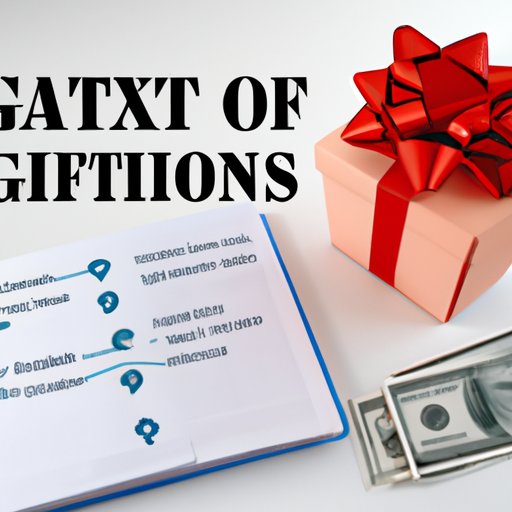
Introduction
Gift giving can be a satisfying and thoughtful gesture, but it can also have potential tax implications. One concept that those who gift large amounts of money should be aware of is gift tax. This article aims to provide an in-depth guide on gift tax exemptions, from the basics to more advanced planning strategies.

Understanding the Basics of Gift Tax Exemption
Gift tax exemption refers to the amount of money that you can give to an individual without it being subject to gift tax. In 2021, the gift tax exemption limit is $15,000 per person annually. This means that you can gift up to $15,000 to any person without needing to worry about gift tax.
Additionally, the lifetime gift tax exemption limit in 2021 is $11.7 million, which means that you can give up to this amount in total lifetime gifts before gift tax kicks in.
To give an example of how this exemption works, let’s say you would like to gift your spouse $25,000 for a special occasion. Under the annual exclusion, the first $15,000 would be exempt from gift tax, but the remaining $10,000 would be subject to gift tax. However, you could use your $11.7 million lifetime exemption to cover the remaining $10,000 gift, which would not result in any gift tax due.
Exploring the History and Evolution of Gift Tax
Gift tax has been around in the United States since the early 20th century, with the first gift tax law being enacted in 1924. Over time, the exemption limits have changed substantially. In the early 2000s, the lifetime exemption was $1 million and the annual exclusion was $10,000. Today, the lifetime exemption is $11.7 million and the annual exclusion is $15,000 per person annually.
It’s important to consider how the current exemption limits compare to previous ones, in order to make informed decisions about gift giving strategies.
Maximizing Your Gift-Giving Strategy
There are various ways to avoid gift tax and make the most of gift giving strategies. One way to do this is by taking advantage of the annual exclusion amount, which we previously explained is currently $15,000 per person annually. By gifting within this limit, you can provide financial assistance to your loved ones without having to pay gift taxes. It’s important to note, however, that you cannot clump multiple annual exclusion gifts together in order to give a large sum above the annual exclusion limit.
Another way to reduce gift tax is gift splitting between spouses. This tactic allows a couple to split the value of a gift so that it’s classified as being half from each spouse. By doing so, the value of the gift is effectively doubled and remains within the annual exclusion limit. This strategy is ideal for couples wanting to give larger gifts or when only one spouse has substantial assets.
Legal ways of avoiding gift tax include charitable giving and making educational or medical payments on someone’s behalf.
The Pros and Cons of Using Gift Tax Exemptions
The advantages of using gift tax exemptions include reducing the amount of your estate, increasing the amount of money that can be transferred tax-free, and providing loved ones with financial support during their lifetime. However, there are also potential disadvantages to consider, such as the potential impact on your estate and your own financial well-being, depending on the value of your assets.
Before taking advantage of gift tax exemptions, it’s important to consider factors such as cash flow, ownership of assets, and whether or not the recipient will pay income taxes on the gift, among other things.
Making the Most of Lifetime Gift Tax Exemption
Lifetime gift tax exemption is the total amount of gift that you can give during your entire lifetime before gift tax applies. Currently, that amount is $11.7 million. If you plan on making a large gift, you may want to consider using your lifetime exemption so as to avoid gift tax. One important thing to note is that you should always plan your gifts, because using lifetime exemption inappropriately can result in estate tax penalties later on.
The Impact of Gift Tax on Estate Planning
A substantial part of estate planning is planning for gift tax and the impact it can have on your estate. Not all gifts are included in your estate, but it is essential to know the rules for what type of gifts fall under the estate’s purview. Including gifts in your estate can impact the amount you pass on to your heirs. Hence, minimizing the impact of gift tax on your estate can involve utilizing the exemptions properly and gifting in a strategic manner.
How to Calculate Gift Tax and File Your Return
If you do need to pay gift tax, it’s important to know how to calculate gift tax and file a return properly. The IRS sets combination rates, which means that gift tax and estate taxes work together. However, there is a gift tax annual exclusion that can reduce the amount of gift tax that’s due. In addition, there are special rules regarding reporting certain gifts on your tax returns.
Conclusion
Gift tax may seem like a complicated topic, but having an understanding of how it works and how to maximize the advantages of gift tax exemptions can be essential in your financial planning. By utilizing strategies such as the annual exclusion amount, gift splitting, and lifetime exemption, you can avoid gift tax and provide your loved ones with financial support. Any individual who intends to give gifts should invest some time in studying gift tax exemptions and develop a plan for gift giving that considers how they can best utilize various exclusion strategies to maximize the value of your gift while minimizing your gift tax liability.
Disclaimer: This article should not be taken as professional tax advice. Always consult with a tax professional for guidance on specific issues related to your individual finances and tax situation.




